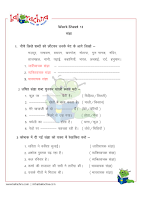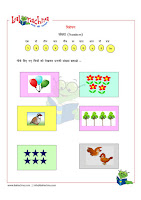Visheshan (Adjectives) are the words which describe a person, place or a thing. Kids
unknowingly, use describing words for the same.
Before planning any worksheet for introducing
Visheshan (Adjective), an Adjective Sorting game should be introduced as group
activity just to teach the basic concept of describing words or Visheshan
(Adjective).
Adjective sorting game
– This is an interesting and simple activity to introduce the describing words
or adjectives.
Preparation –
· Take
three baskets and paste the captions of colour (रंग),
size/shape (आकार), feelings (भावना) and place the baskets on a table in front of
the class.
· Prepare
a deck of colourful adjective flashcards.
colour
(रंग)- red, blue, yellow, green, orange, brown,
black and white, size/shape (आकार) -
big/small, short/tall, fat/thin, round, triangular, square, oval and feelings (भावना) – happy/sad,
angry/laughing,
Activity-
·
Pick up a card from the deck e.g. a
smiling face. Ask them if a smile is a colour, a size/shape or a feeling?
Once they have correctly identified the type
of adjective smiling card as feelings, place the card in the corresponding
basket.
Group activity on Sensory Descriptions
Preparation :
· Divide
the kids into the groups of five.
· Make
five- round tokens and label them as per the five senses, Sight (दृष्टि/नज़र),
Smell
(गंध/सूंघ), Sound (ध्वनि/आवाज़), Taste (स्वाद),
Touch
(छूना/स्पर्श).
Distribute these five tokens to each group and kid can pick up one token each
and identify it.
Ø At a later stage,
you can include flashcards based on Number (गिनती/संख्या), Weather (मौसम), Shape (आकार), Size ( बनावट ).
· Keep some assorted
objects in every group for sensory description by each kid based on five tokens
he/she has.
e.g. a ball, coin,
paper, candy and a feather.
Ask them to pick up each object
and describe it
according to the token they have. They
may come up
with funny/silly observations
too, but that is the fun of
group games.
Fishing for adjectives
This group activity requires prior preparations by
tutors/parents but it can also be played with other introductory topics like
Noun and verbs.
Preparation:-
·
Create
several colourful flashcards by writing nouns, adjectives and verbs in bold
letters and fix a paper clip to them.
· Make a simple fishing rod, from cane
or bamboo and tie a magnet to the end of the fishing line.
·
Spread
out the cards face-up on the floor of the classroom.
Activity:-
· Before this fishing activity for
adjectives begins, make sure kids can differentiate between the adjectives and
non-adjectives.
· Next step is to ask each child to
come forward and ‘fish’ for an adjective flashcard from the spread-out cards
with the help of a magnetic fishing rod.
· When
they successfully pick out a flashcard with an adjective, ask them to name an
object and use that adjective to describe it.
Educational group activities are very effective and play an
important role in learning a concept. Children don’t even realize that they are
learning while playing. The fun learning environment takes the stress off and
kids learn fast. When the concept of the adjective is clear to the kids then worksheets
can be introduced.
These are a few simple activities for introducing Visheshan (Adjectives). Your suggestions are most welcome.
Happy teaching !!!!












































